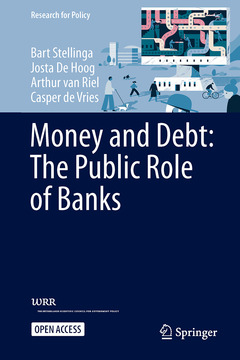Description
Money and Debt: The Public Role of Banks, 1st ed. 2021
Research for Policy Series
Authors: Stellinga Bart, de Hoog Josta, van Riel Arthur, de Vries Casper
Language: English
Subjects for Money and Debt: The Public Role of Banks:
42.19 €
In Print (Delivery period: 15 days).
Add to cartPublication date: 06-2021
Support: Print on demand
52.74 €
In Print (Delivery period: 15 days).
Add to cartPublication date: 06-2021
Support: Print on demand
Description
/li>Contents
/li>Biography
/li>Comment
/li>
This Open Access book from the Netherlands Scientific Council for Government Policy explains how money creation and banking works, describes the main problems of the current monetary and financial system and discusses several reform options. This book systematically evaluates proposals for fundamental monetary reform, including ideas to separate money and credit by breaking up banks, introducing a central bank digital currency, and introducing public payment banks. By drawing on these plans, the authors suggest several concrete reforms to the current banking system with the aim to ensure that the monetary system remains stable, contributes to the Dutch economy, fairly distributes benefits, costs and risks, and enjoys public legitimacy. This systematic approach, and the accessible way in which the book is written, allows specialized and non-specialised readers to understand the intricacies of money, banking, monetary reform and financial innovation, far beyond the Dutch context.
Bart Stellinga is a senior research fellow at the Netherlands Scientific Council for Government Policy (WRR). He studied political science (MSc) and philosophy (MA) at the University of Amsterdam (UvA). He obtained his doctorate at the UvA in 2018 for his thesis ‘The financial valuation crisis’, addressing the politics of post-crisis financial reform in the European Union. At the WRR Bart has contributed to publications on the privatization of public sector activities, food policy, financial supervision, and monetary policy and financial regulation. He is also a research associate at the Political Economy and Transnational Governance (PETGOV) programme group at the UvA.
Josta de Hoog is a senior research fellow at the WRR. She studied Public Administration (MSc) and Law (LLM) at the Erasmus University Rotterdam. Before starting at the WRR, Josta worked as a consultant for McKinsey & Company. She also held a position as researcher andlecturer at the Netherlands School of Public Administration (NSOB) and she was a board member of the National ThinkTank Foundation. Her work at the WRR has focused on a variety of topics, including citizen participation in politics, food policy, monetary policy and financial regulation, and health care.
Arthur van Riel is a senior research fellow at the WRR. He studied Economic History and Economics at Leiden University and Freie Universität Berlin. He obtained his doctorate from Utrecht University in 2018 for his thesis ‘Trials of Convergence. Prices, Markets and Industrialization in the Netherlands, 1800-1913'. He has held posts at VU University Amsterdam, Utrecht University, the Netherlands Economic Institute (Ecorys), the Ministry of the Interior and Kingdom Relations and the Ministry of Finance. He has published on a range of topics, including the European Monetary Union, elections and the economy during the Weimar Republic, Dutch economic history in the early m
These books may interest you

Money - The New Rules of the Game 121.31 €



